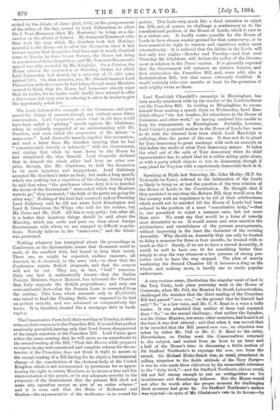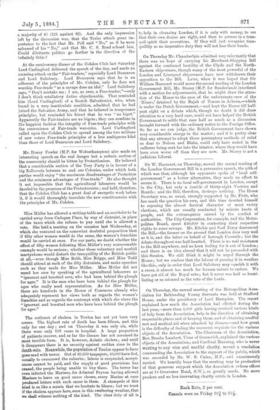A very curious scene, illustrating the singular want of tact
in the Tory Party, took place yesterday week in the House of Commons, when Mr. Pell, the Member for South Leicestershire, challenged the decision that the third reading of the Franchise Bill had passed "nem. con.," on the ground that he himself had said " No " in a low voice, and Mr. C. S. Read in a voice a trifle louder. It was admitted that neither of them had repeated their " No " on the second challenge ; that neither the Speaker, nor the Prime Minister, nor many other members, had heard it at the time it was first uttered ; and that when it was moved that it be recorded that the Bill passed nem. con., no objection was taken by either Mr. Pell or Mr. C. S. Read to the entry. Nevertheless, on Friday week the Conservatives returned to the subject, and wasted from an hour to an hour and a half of the House's time in discussing a futile motion of Sir Stafford Northcote's to expunge the nem. eon. from the record. Sir Michael Ilieks-Beach wag, as usual, prominent in calling attention to the feeble attitude of the Tory Party— it was he who made them ridiculous by his memorable reference to the " dirty trick,"—and Sir Stafford Northcote, also as usual, did not feel strong enough to put an extinguisher on his troublesome and floundering follower. But -the House would not alter its words after the proper moment for challenging their accuracy had .gone by. Sir Stafford Northcote's motion 'was rejected—in spite of Mr. Gladstone'S vete in its favour—by
a majority of 43 (125 against 82). And the only impression left by the discussion was, that the Tories attach great im- portance to the fact that Mr. Pell said "No," as if he were ashamed of his " No," and that Mr. C. S. Read echoed him. Could dilettante politics go further in the direction of the infinitely little ?











































 Previous page
Previous page